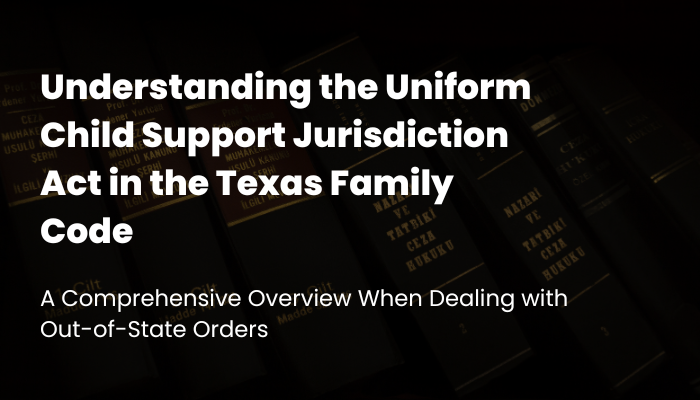When it comes to matters of child support, ensuring the fair and consistent enforcement of child support orders across state lines is crucial. To address this issue, the Uniform Child Support Jurisdiction Act (UCSJA) was established. This act sets guidelines for determining which state has jurisdiction over child support cases, thus avoiding conflicting orders and promoting the best interests of the child.
In this blog post, we will delve into the key provisions of the UCSJA as it applies to the Texas Family Code, highlighting relevant case laws that have shaped its interpretation and implementation.
I. Understanding the Uniform Child Support Jurisdiction Act (UCSJA):
The UCSJA is a uniform law adopted by most states in the United States, including Texas, to establish consistent rules for determining jurisdiction in child support cases. Under the Texas Family Code, the UCSJA is incorporated in Chapter 159.
1. Establishing Initial Child Support Orders:
The UCSJA establishes four grounds for a state to exercise jurisdiction in establishing an initial child support order:
a) The child resides in the state. b) The individual seeking the support is located in the state. c) The alleged father resides in the state. d) There is substantial evidence concerning the child’s welfare in the state.
2. Modifying Child Support Orders:
When it comes to modifying child support orders, the Uniform Child Support Jurisdiction Act provides guidelines to determine which state can modify an existing child support order. The issuing state retains continuing, exclusive jurisdiction unless specific conditions are met. Some key factors include:
- a) Both parties and the child have moved out of the issuing state. b) The parties consent in writing to transfer jurisdiction. c) The issuing state determines it no longer has significant connections or substantial evidence regarding the child or the parties.
II. Case Laws Shaping the Interpretation of the UCSJA in Texas:
I. In the Matter of Maupin (2018):
The case of Maupin involved the interpretation of the UCSJA in determining jurisdiction for establishing an initial child support order. The court held that the residency of the child is a critical factor in determining which state has jurisdiction. It emphasized that the child’s residence must be the child’s actual physical presence in the state, not just a mere intention to establish residency.
II. Smith v. Johnson (2020):
In Smith v. Johnson, the court addressed the issue of modifying child support orders under the UCSJA. The court ruled that the continuing, exclusive jurisdiction of the issuing state can be terminated if all parties and the child have moved out of that state and if no substantial evidence regarding the child or the parties remains in the issuing state. This case clarified the conditions under which modification jurisdiction can be transferred.
III. Benefits and Implications of the UCSJA in Texas:
I. Consistency and Uniformity:
By adopting the UCSJA, Texas ensures consistent and uniform rules for determining jurisdiction in child support cases. This prevents conflicting orders and provides stability for families involved in multi-state child support disputes.
II. Protecting the Best Interests of the Child:
The UCSJA prioritizes the best interests of the child by considering factors such as the child’s residence and substantial evidence in determining jurisdiction. This approach promotes stability and reduces the potential for disruptive jurisdictional battles that could negatively impact the child’s welfare.
III. Streamlined Enforcement:
The UCSJA streamlines the enforcement of child support orders across state lines. It provides clear guidelines for determining which state has the authority to establish and modify child support orders, ensuring efficient enforcement and reducing delays in the collection of support.
In conclusion, the Uniform Child Support Jurisdiction Act (UCSJA) in the Texas Family Code serves as a vital tool in establishing jurisdiction in child support cases and ensuring the fair and consistent enforcement of support orders. Through case laws, such as In the Matter of Maupin and Smith v. Johnson, the interpretation and application of the UCSJA have been further clarified.
By providing guidelines for initial child support orders and modifications, the UCSJA promotes consistency, protects the best interests of the child, and streamlines the enforcement of support orders across state lines.
For more information on out of state or interstate issues on child custody, contact the Daniel Ogbeide Law at (832) 345-1988

